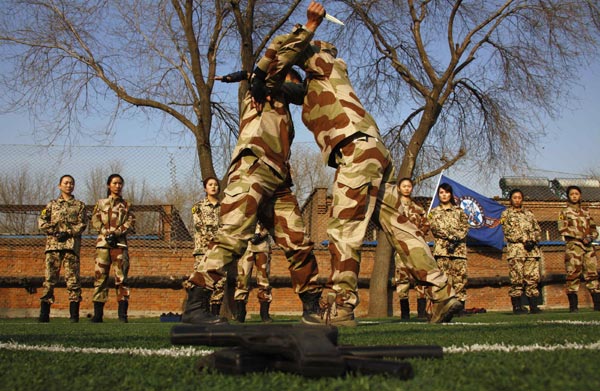Flight versus fight
 |
|
China's female bodyguard boot camps often require them to get bottles smashed over their heads, tackle knife-wielding assailants and be stomped facedown into water. Recruits also learn evasive driving and advanced reconnaissance. David Gray / Reuters, Tong Guoqiang / for China Daily |
Despite popular conceptions, bodyguards do more to push threats to arm's length than strike attackers with their fists. Tiffany Tan reports.
On the big screen, bodyguards are often portrayed as fighters eager to break bones and draw blood. In the real-life security business, they're actually trained to keep trouble away.
Bodyguard academies teach students to identify dangers and contain or evade threats. In China, protection agents' basic training includes advanced reconnaissance, threat assessment and evasive driving. There are anti-kidnapping exercises and rescue drills, too.
 |
| Female bodyguards keep threats at arm's length |
Some Chinese bodyguards - especially the growing number of women in the sector - also learn secretarial skills and business etiquette. These help agents blend into entrepreneur clients' worlds and enable them to assist with office work if needed. Such lessons also prevent them from making gaffes as they rub elbows with the rich, famous and powerful.
"Before I'd taken etiquette lessons, I thought being able to fight was enough," says Lulu, a 28-year-old bodyguard with Bojing Security Agency in Beijing, who asked to use a pseudonym for confidentiality reasons (an industry practice).
"But every time we'd appear in public, my boss felt really embarrassed with my behavior she thought I didn't even know how to stand or sit properly."
It's also helpful to know the appropriate attire and makeup for various occasions.
Yu, a bodyguard with Shanghai Shenyingtewei Security Consulting who only gave her surname for security purposes, says work sometimes involves slipping into a formal evening dress.
"There are bosses who like attending ostentatious and extravagant parties," the 26-year-old says.
"But they don't want me to be recognized as a bodyguard. They want to keep a low profile."
When the difference between safety and peril is a matter of seconds, a quick disguise helps execute a speedy escape. Among the work essentials Lulu carries, she says, are makeup and extra clothes.
"I'm ordinarily quite boyish," she says.
"But when I quickly get into a dress and high heels, I become very womanly and you wouldn't recognize me."
Chinese bodyguards also get lessons in domestic and international law, since they need to know the line between defensive and criminal behavior while protecting clients. Mainland law prohibits civilians, including bodyguards, from carrying firearms.
Since China's bodyguard industry is young - private security firms were legalized in 2010 - some domestic training institutes are looking to learn more about security concepts and combat tactics by hiring foreign instructors.
Foreign experts usually emphasize preventive security over combat solutions.
Most training courses in the civilian market teach bodyguards how to resolve an issue once it occurs, or "force-on-force training", rather than preventing attacks through intelligence gathering and proactive measures, says Leo Strand, director of operations at the ISA Academy, headquartered in Stockholm, Sweden.
The company, founded in 1986 and with offices in Washington DC, Singapore, Manila and Beirut, counts the United Nations and the US Department of Defense among its clients.
"Reactive protection, which is easier to teach, has never been able to stop an attack," he says.
The approach is "no longer realistic" in today's world with its ever-changing threats, he says.
But Strand says preventive security requires more resources and skills.
Xu Lin contributed to this report.
Related: Securing a woman's world






















